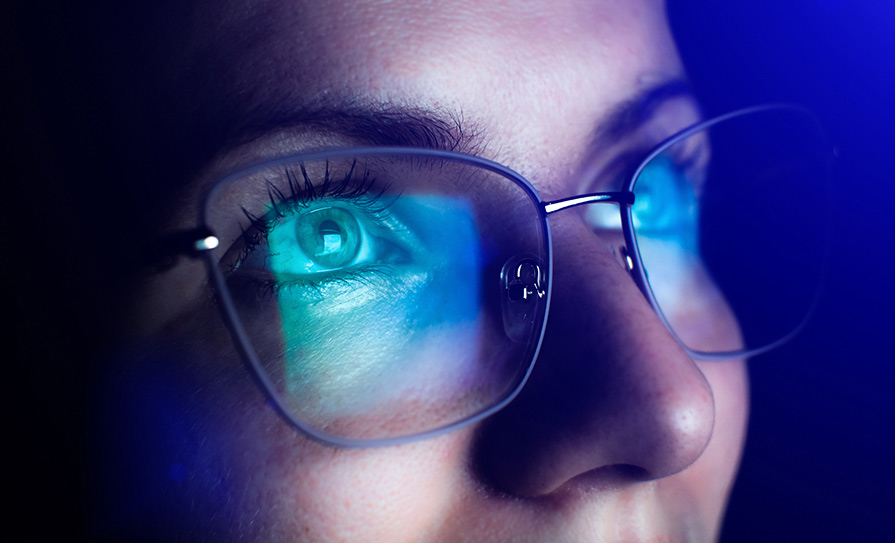We all need light, and this will become more apparent in the months ahead as the shorter days literally darken our doors. Even aside from natural sunlight, the benefits of artificial light in certain conditions are becoming clearer. But much has changed in recent decades, and the amount of ‘blue light’ (BL) we all consume has increased exponentially. The younger generation, the ones who have known the Internet for all their lives, are particularly bombarded by BL.
BL is essentially light in the blue spectrum and has shorter wavelengths and higher energy than other colours. Some research has shown a link between eye damage and short-wave blue light with wavelengths between 415 and 455 nanometres, while other research shows different effects.
So, should we be concerned?
Our relationship with screens is still an evolving one. Many readers will, like myself, have grown up in a house where there was ‘a TV’. And that was it, one television that had to be shared, with mum or dad having the final say (or a big brother or sister). ‘Don’t sit too close to the TV’ was the warning, as it would ‘ruin your eyesight’.
But mum may have had a bit of science behind her rebukes. In 1967, testing showed that large-screen models of TVs built by almost every manufacturer were emitting radiation levels that were beyond acceptable limits. This equated to more than 110,000 TV sets that were haemorrhaging radiation. The higher radiation levels were due to the large amount of power required to run these early TVs.
It was also found that the radiation escaped the set on a crescent-shaped downward slope trajectory. If you were six feet or more away from the TV, you escaped any exposure. But if you had the set on a high shelf – or, like me, as a child you would watch it lying flat on your stomach in front of it – you were in the firing line. So not getting too close to the old TVs was good advice.
But what of us now? We certainly have a lot more screen-time, and research has been emerging for a while to suggest that artificial light is a risk factor for sleep and/or circadian disorders. In particular, there is evidence to suggest that acute BL exposure can in fact lead to oxidative stress and the death of retinal cells that are responsible for photoreception.
Further, a study published last year in Frontiers in Ageing showed that in fruit flies, chronic BL exposure across the lifespan led to accelerated ageing and a shorter life. Not only that, there was evidence of brain neurodegeneration, even in flies with genetically-ablated eyes. This suggests that BL can also damage tissues and cells that are not specialised for light perception.
In their study, the authors focused on extra-retinal tissues, comparing metabolomic profiles in flies kept either for 10 or 14 days in constant BL or constant darkness. Dramatic metabolic rearrangements were found in the heads of flies kept in BL for 14 days, including impaired energy production, onset of neurodegeneration, and significantly reduced levels of several neurotransmitters. This suggests that BL disrupts homeostasis. Taken together, the results suggest that BL interferes with vital metabolic pathways.
A 2019 study in Ageing and Mechanisms of Disease showed that acute BL exposure leads to photoreceptor death in the retinas of mice and flies. Interestingly, this study suggested that we don’t need to actually see the BL to be affected by it. Even in flies who were born with no eyes, extended BL exposure acted as a stressor and turned on specific stress-activated genes that caused ageing.
Smartphones are not without blame either. ‘Transient smartphone blindness’ has become a thing in recent years, and cases are popping-up here and there, including one reported in the New England Journal of Medicine in 2016.
Of course, like the TVs of the 1960s, it may take a couple of decades before we get some definitive research on what all this BL is doing to us in the real world.
So should we be wary of too much artificial screen light? Possibly. Should people be cognisant of it? Definitely. Can we avoid it? That will be more difficult for some of us than for others.













Leave a Reply
You must be logged in to post a comment.